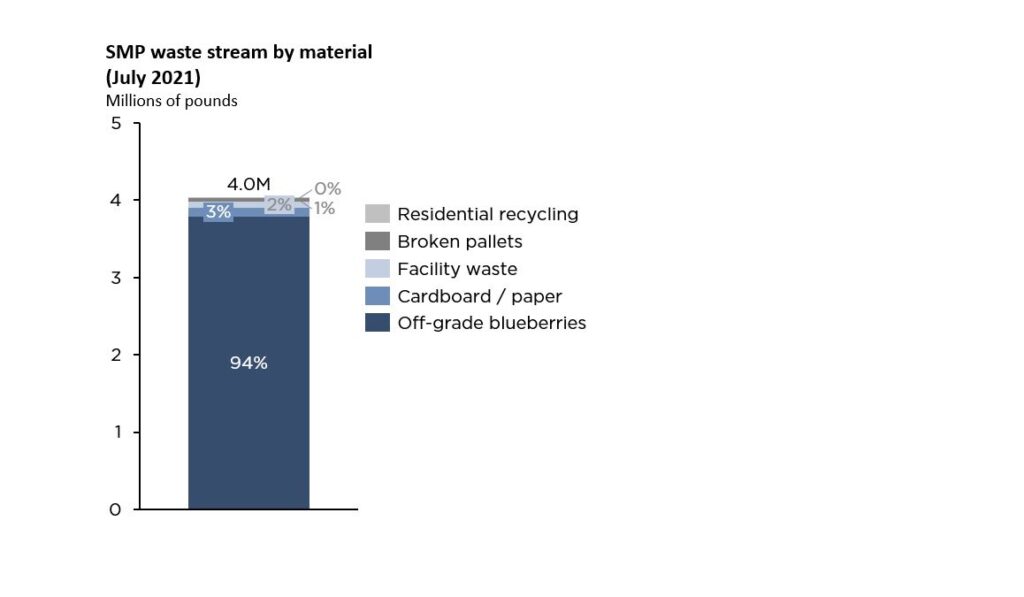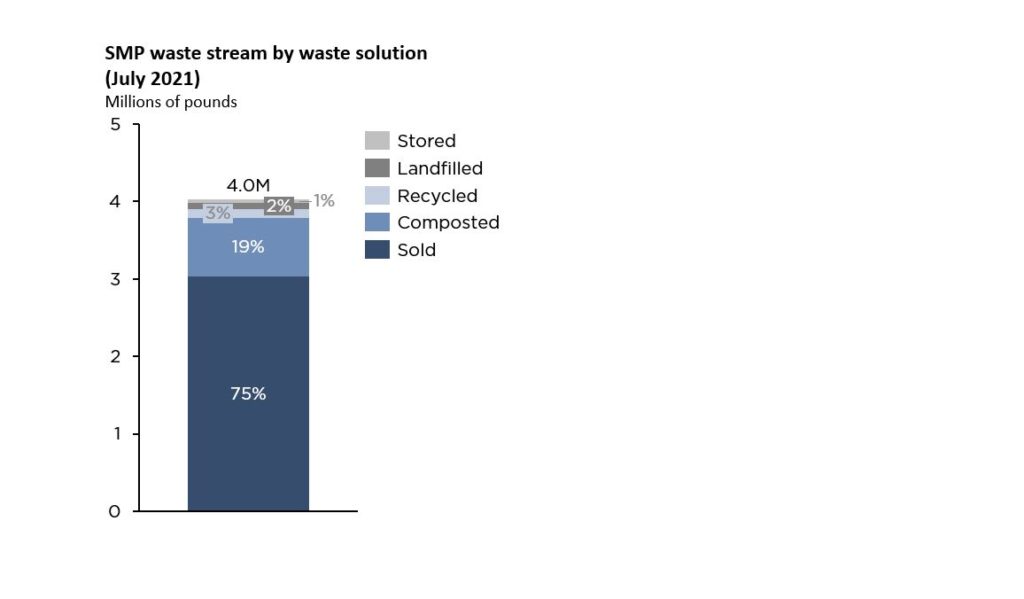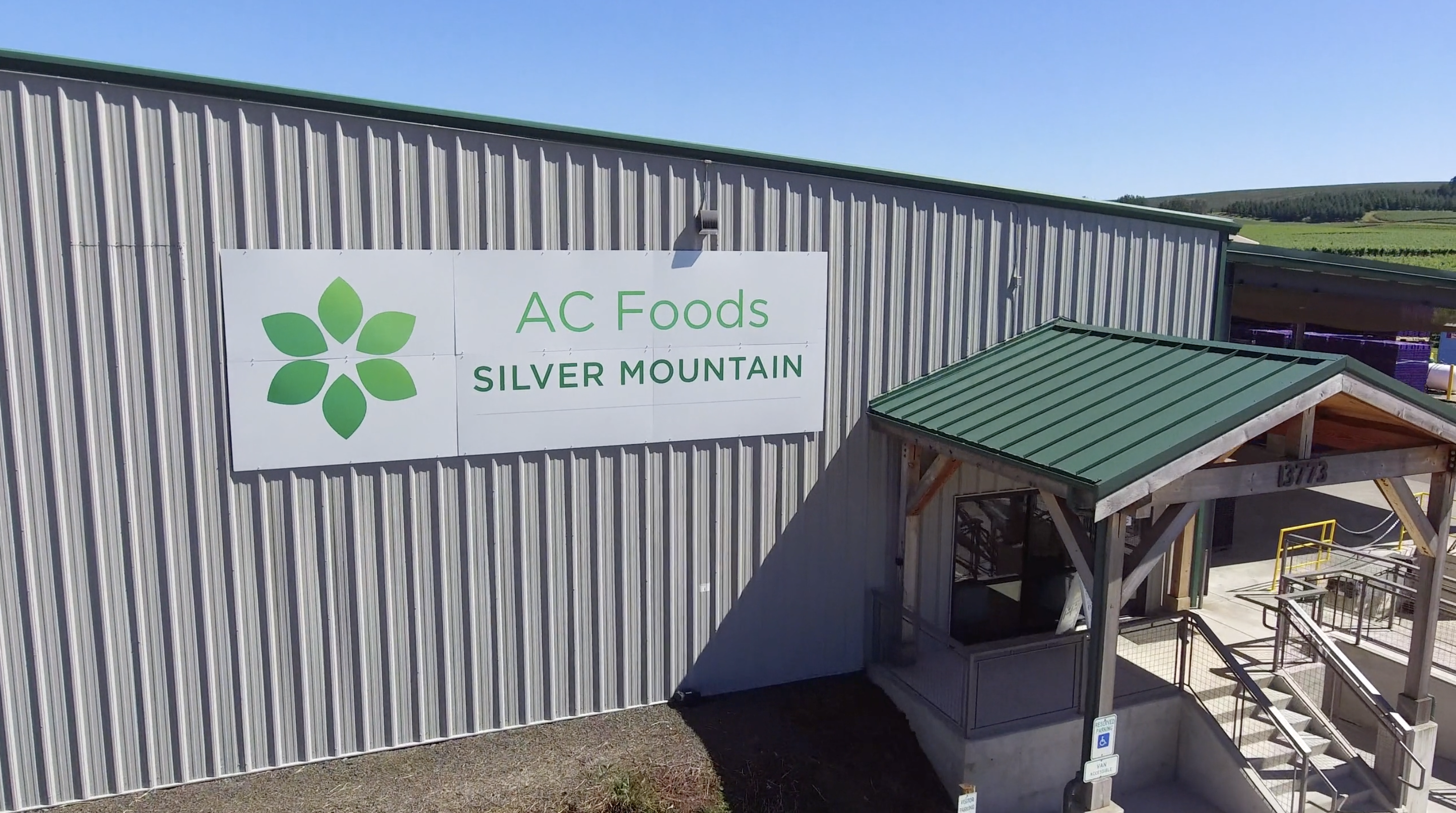Agriculture Capital is one of the largest, if not the largest, organic blueberry producers in North America. To complement our portfolio of blueberry farmland assets, we have invested behind midstream businesses (think fresh packing, cold storage, freezing, etc.) in order to ensure our berries reach end markets efficiently and in peak condition.
One of these midstream businesses, Silver Mountain Packing (SMP) based in Sublimity, Oregon, achieved Zero Waste Facility Certification from SCS Global Services in 2022. The process certified that over 92% of the facility’s waste does not get landfilled or incinerated. The process also revealed important insights about the possibilities of and challenges associated with achieving a zero waste future.
SMP is a fresh blueberry packing house that packs, stores, and distributes all of the blueberries produced from Agriculture Capital’s farms in Oregon as well as blueberries from other producers. As part of the Zero Waste certification process, SCS Global Services evaluated all inputs and outputs from the facility in July 2021. Below, we’ve summarized the key takeaways from the evaluation.
Unsurprisingly, the vast majority of potential waste produced by the blueberry packing process is organic material — specifically, blueberries that do not meet the quality specifications to be sold in the fresh market. Of the ~4 million pounds of waste produced in the month of the SCS study, ~3.8 million pounds (~95%) were blueberries that did not meet fresh market quality specs.

These data reveal the first insight about waste in food processing settings: across food categories, most facility waste is food waste.
If sent to the landfill, this material is economically and environmentally harmful. Food is the single most common material found in landfills, accounting for 22–24% of solid municipal waste. As food decomposes, it produces methane, a greenhouse gas roughly 30x more potent than CO2 over a 100 year period. Further, each year, the world loses or wastes roughly 30% of food produced for human consumption, yet food insecurity afflicts even developed countries.
Fortunately, food waste can be diverted from the landfill and provide economic value to processing businesses. The key achievement enabling Zero Waste Facility Certification at SMP is a 100% diversion rate of food waste away from landfill & incineration. Instead of throwing away off-spec berries, SMP sells them to frozen processors and ingredient manufacturers or composts them. Approximately 80% of these fresh blueberry byproducts are sold to other businesses while 20% are composted.

These data reveal the next insight about food waste: investments in landfill diversion strategies yield economic value. Instead of paying hauling and tipping fees on millions of pounds of blueberries, SMP generated a profit or at least partially recovered costs by selling them to other businesses that could use them productively. Similarly, composting the berries that could not be sold to these industrial channels avoided landfill fees and also helped offset soil/plant nutrition input costs at AC farms the following season. SMP manages its own compost program, which minimizes carbon emissions and cost, but third-party compost companies are also a viable option for most food processors.
As food and ag manufacturers consider their waste strategy, we recommend the following framework for prioritizing resources and maximizing value: 1) explore new channels / new products to recoup value; 2) compost remaining organic material and find an appropriate end use for that compost; 3) recycle; 4) send to landfill as a last resort.

Just 2% of SMP’s total waste was sent to a landfill, and most of this material falls under the category of “facility waste,” which includes paper towels, plastic gloves, hairnets, broken clamshells, etc. Again, all organic material was either sold or composted, and all cardboard was recycled. To state the obvious, this level of waste diversion requires focus and skill from management.
While we are immensely proud of our waste diversion achievements at SMP, and the impact benefits our bottom line, we cannot help but wonder how we can still do better. Waste is not only a challenge on farm or in food processing; it spans the entire value chain. In our experience, the most vexing challenges to a zero-waste future primarily reside downstream with customers and consumers.
Sometimes, these downstream challenges can be addressed relatively easily. Consider one example where we acquired a businesses that shipped product in expanded polystyrene (EPS). Not only are recycling opportunities for this material limited or nonexistent but it is also more expensive than the more sustainable option. In this case, we worked with the business’ customers to transition from EPS to corrugated cardboard, which reduced value chain costs, avoided landfill disposal fees for customers, and broadly improved our relationships with these customers.
However, not all packaging problems are so simple to solve. For example, while we are exploring alternatives, we currently ship fresh blueberries in plastic clamshells, which all end up in landfills in a best case scenario. We cannot change the fact that consumers like to visually inspect blueberries before purchasing a unit, and we have not yet found a better alternative. Substituting away from the plastic clamshell will require customer buy-in, consumer education, and updates to our facilities’ equipment and processes. But again, these challenges present opportunities to collaborate with our customers and innovate with vendors. We look forward to reporting back on our progress on this challenge as well as our zero waste efforts more broadly.
